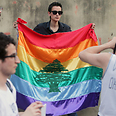
Lebanon: Homosexuals no longer 'perverts,' but still target
Violent police raid on Beirut LGBT club inspires controversy. Transgender arrested claims was beaten, stripped, photographed by police. Lebanon's gay community nonetheless registers significant gains, even with Hezbollah paper
The first of such events was a violent police raid on a gay club in the famous Christian town Dekwaneh in Beirut's northern region. According to reports by LBC, a television network which frequently reports on the community, the police attacked club-goers and beat them because of their sexual orientation.
Related stories:
- Transgender Pakistanis running for election
- Top rabbi: Soften attitude towards gays
- Conjugal visits for gay prisoners? Not in Israel
As a result of the raid, three homosexuals and a transgender were arrested. It was further reported that the three were brought to the local police station, forced to strip and then photographed in the nude so police could assess whether they had undergone sex change.

Anti homophobia protest, Beirut (Photo: AFP)
Dekwaneh Mayor Antoine Chakhtoura was the one who ordered the club to be shut down, fearing the "public's moral degradation."
In an interview to the LBC channel, Shktura said: "I have seen with my own eyes people in the corner of the bathroom, people talking with one another, kissing, touching one another, and even a man in a skirt. I saw these homosexual activities; these are sexually shameful acts."
In the interview, the mayor confirmed that the four were arrested, as well as the fact that they were forced to strip and have their photograph taken.

Club shut down (Photo: AP)
"We wanted to know who these people were and whether they were men or women. It seemed as if they were half male, half female and we don't allow such things in my community," he insisted, adding that drug use was also prevalent in the club.

Police photographs of the transgender
"They beat me, treated me with cruelty and humiliated me. They used shamming terminology such as 'soft like a woman' and 'half man,' transgender victim said.
What has recently been adding fuel to the fire is a number of comments made by Marwan Charbel, the interior minister of Lebanon's interim government, who publically backed the local mayor, and in an interview said: "Lebanon is opposed to homosexuality, and according to Lebanese law it is a criminal offense."

Caricature at raid's expense. Lebanese news site
Despite these statements and the raid itself, Lebanon's LGBT community has registered no small amount of achievements.
For example, when such raids are reported in local media outlets, no small feet in itself, the preferred term for those frequenting them is no longer "perverts" but rather "same-sexuals."
Even Al-Akbar – a religious, Hezbollah affiliated newspaper – reported on the aforementioned raid as well as a protest organized in response by a local LGBT organization.
In the Al-Akbar report, the protest, which was held in front of the public prosecution's Beirut offices, was described as being held in response to actions taken against "same-sexuals," not perverts.

'No to homophobia' (Photo: AFP)
In many respects, those responsible for the change are a local organization called "Helem" (in Arabic, an acronym of Lebanese Protection for Lesbians, Gays, Bisexuals and Transgenders).
George Azzi, Helem's coordinator, said that before 2005, the state would turn a blind eye to clubs and bars affiliated with the community, mostly to protect tourism, but also because the owners would bribe local police.

'United against criminal discrimination' (Photo: AFP)
However, when a violent hate crime targeted the community, the media repeatedly failed to report the incident. But now, due to work of the organization, he insists things have changed.
"I remember in October 2005, after a group of boys were beaten (because of their sexual orientation) in a Beirut square, for the first time a Lebanese paper published our condemnation of the incident, even if it was only a French language one," he proudly said.

An additional achievement the group took pride in is bringing about an end to rectal examinations for those "suspected of homosexuality."
According to one of the organization's founder, "After last year's incident, in which 36 boys were arrested, taken to the police station, and forced to undergo this examination, we fought against this practice which is a gross violation of basic human rights – and we succeeded. If anybody undergoes such a procedure today, then those behind it will face punishment."
However, the very same activist was forced to admit the widespread activity on a national level does not always prevent violence at a local level.
"Despite reaching understandings with ministers and police officials not to persecute homosexuals, these agreements fail to trickle down to local stations where police continue to act violently against the community," he said.
Some two weeks ago, Dekwaneh residents held a protest in support of their mayor; in response, the LGBT community held their own counter-protest.
Their lawyer, Nizar Sarya, active in the field of human rights, called for the prosecution of the mayor for overstepping his authority.
- Receive Ynetnews updates directly to your desktop










